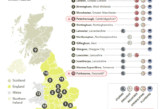 The Budget — another missed opportunity to fix the housing crisis, says Matthew Warburton, Policy Advisor at the Association of Retained Council Housing (ARCH).
The Budget — another missed opportunity to fix the housing crisis, says Matthew Warburton, Policy Advisor at the Association of Retained Council Housing (ARCH).
Forecasts of only sluggish growth for the UK economy left Chancellor Jeremy Hunt unable to deliver significant tax cuts or new investment to please Conservative backbenchers or win back lost support in the forthcoming General Election. The underwhelming announcement of a further 2% cut in national insurance contributions only emphasises how little scope he had for the traditional Budget surprise.
Concern about the continuing high level of public debt was probably responsible for the absence of any reference to affordable housing in the Chancellor’s speech. Despite clear evidence that building more social housing could help boost the economy as well as fix the housing crisis, the Treasury seemingly remains wedded to the belief that all public borrowing has the same economic impact. This is a uniquely British misconception; other countries draw a clear distinction between borrowing that must be repaid from taxes, and borrowing to invest in assets that yield predictable returns.
Research commissioned by ARCH and others over the last decade has shown beyond reasonable doubt that a big new programme of council housebuilding would yield substantial gains to the Exchequer in a relatively short time, by enabling savings on temporary accommodation and benefit payments to private tenants, not to mention broader economic and social benefits. The latest example was published in February by the Centre for Economic and Business Research, for Shelter and the National Housing Federation. It shows that the next government could add £51.2bn to the economy, including £12bn profit to taxpayers by building 90,000 social homes.
The small print
The only new policy relevant to council housing is buried deep in the small print of the Budget documentation. It is the announcement of “additional flexibility” for councils in the use of Right to Buy receipts — an increase in the percentage of the cost of a replacement home that can be funded from receipts from 40 to 50%. This is a change that ARCH has been pressing for ever since building costs started to accelerate in the aftermath of the COVID pandemic — simply to reflect the impact of these costs, and the subsequent increase in interest rates.
While this concession is welcome, its effect will be largely cancelled out by the Government’s decision not to extend the two-year period — which ended on 31st March — during which councils have been allowed to retain and reinvest all their RTB receipts. We are still a long way away from policies that enable councils to deliver one-for-one replacement of homes sold under RTB.
Unable to build at the scale demanded by housing needs, and unable to replace the homes they have to sell under RTB, councils are faced with the impossible task of reconciling their duty to house growing numbers of homeless households, not to mention hundreds of thousands of applicants waiting for a council house, with the supply of housing at their disposal. But instead of helping address the underlying causes of this problem, the Government has chosen to consult on changes to allocations policy which sound well in some ears — more priority for British applicants — but will make very little difference to who gets housed, and none at all to the number of homes available.
Header image: ©Jevanto Productions/AdobeStock










